阅读理解专题训练与答案
- 格式:pdf
- 大小:23.58 KB
- 文档页数:4
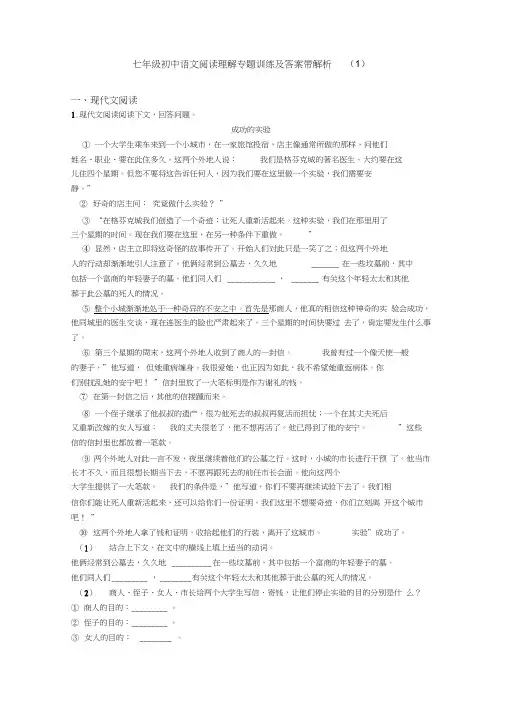
七年级初中语文阅读理解专题训练及答案带解析(1)一、现代文阅读1.现代文阅读阅读下文,回答问题。
成功的实验①一个大学生乘车来到一个小城市,在一家旅馆投宿,店主像通常所做的那样,问他们姓名、职业、要在此住多久。
这两个外地人说:我们是格芬克城的著名医生。
大约要在这儿住四个星期。
但您不要将这告诉任何人,因为我们要在这里做一个实验,我们需要安静。
”②好奇的店主问:究竟做什么实验?”③“在格芬克城我们创造了一个奇迹:让死人重新活起来。
这种实验,我们在那里用了三个星期的时间。
现在我们要在这里,在另一种条件下重做。
”④显然,店主立即将这奇怪的故事传开了。
开始人们对此只是一笑了之;但这两个外地人的行动却渐渐地引人注意了。
他俩经常到公墓去,久久地_______ 在一些坟墓前,其中包括一个富商的年轻妻子的墓。
他们同人们____________ ,_______ 有关这个年轻太太和其他葬于此公墓的死人的情况。
⑤整个小城渐渐地处于一种奇异的不安之中。
首先是那商人,他真的相信这种神奇的实验会成功,他同城里的医生交谈,现在连医生的脸也严肃起来了。
三个星期的时间快要过去了,肯定要发生什么事了。
⑥第三个星期的周末,这两个外地人收到了商人的一封信。
我曾有过一个像天使一般的妻子,”他写道,但她重病缠身。
我很爱她,也正因为如此,我不希望她重返病体。
你们别扰乱她的安宁吧!”信封里放了一大笔标明是作为谢礼的钱。
⑦在第一封信之后,其他的信接踵而来。
⑧一个侄子继承了他叔叔的遗产,很为他死去的叔叔再复活而担忧;一个在其丈夫死后又重新改嫁的女人写道:我的丈夫很老了,他不想再活了。
他已得到了他的安宁。
”这些信的信封里也都放着一笔款。
⑨两个外地人对此一言不发,夜里继续着他们的公墓之行。
这时,小城的市长进行干预了。
他当市长才不久,而且很想长期当下去,不愿再跟死去的前任市长会面。
他向这两个大学生提供了一大笔款。
我们的条件是,”他写道,你们不要再继续试验下去了。
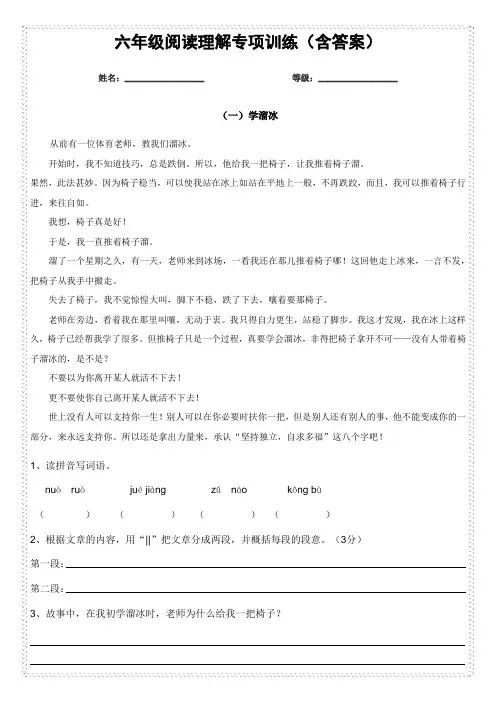
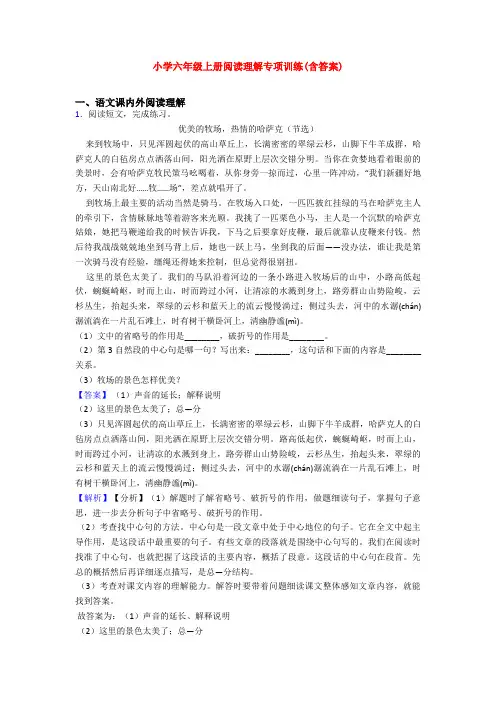
小学六年级上册阅读理解专项训练(含答案)一、语文课内外阅读理解1.阅读短文,完成练习。
优美的牧场,热情的哈萨克(节选)来到牧场中,只见浑圆起伏的高山草丘上,长满密密的翠绿云杉,山脚下牛羊成群,哈萨克人的白毡房点点洒落山间,阳光洒在原野上层次交错分明。
当你在贪婪地看着眼前的美景时,会有哈萨克牧民策马吆喝着,从你身旁一掠而过,心里一阵冲动,“我们新疆好地方,天山南北好……牧……场”,差点就唱开了。
到牧场上最主要的活动当然是骑马。
在牧场入口处,一匹匹披红挂绿的马在哈萨克主人的牵引下,含情脉脉地等着游客来光顾。
我挑了一匹栗色小马,主人是一个沉默的哈萨克姑娘,她把马鞭递给我的时候告诉我,下马之后要拿好皮鞭,最后就靠认皮鞭来付钱。
然后待我战战兢兢地坐到马背上后,她也一跃上马,坐到我的后面——没办法,谁让我是第一次骑马没有经验,缰绳还得她来控制,但总觉得很别扭。
这里的景色太美了。
我们的马队沿着河边的一条小路进入牧场后的山中,小路高低起伏,蜿蜒崎岖,时而上山,时而跨过小河,让清凉的水溅到身上,路旁群山山势险峻,云杉丛生,抬起头来,翠绿的云杉和蓝天上的流云慢慢淌过;侧过头去,河中的水潺(chán)潺流淌在一片乱石滩上,时有树干横卧河上,清幽静谧(mì)。
(1)文中的省略号的作用是________,破折号的作用是________。
(2)第3自然段的中心句是哪一句?写出来:________,这句话和下面的内容是________关系。
(3)牧场的景色怎样优美?【答案】(1)声音的延长;解释说明(2)这里的景色太美了;总—分(3)只见浑圆起伏的高山草丘上,长满密密的翠绿云杉,山脚下牛羊成群,哈萨克人的白毡房点点洒落山间,阳光洒在原野上层次交错分明。
路高低起伏,蜿蜒崎岖,时而上山,时而跨过小河,让清凉的水溅到身上,路旁群山山势险峻,云杉丛生,抬起头来,翠绿的云杉和蓝天上的流云慢慢淌过;侧过头去,河中的水潺(chán)潺流淌在一片乱石滩上,时有树干横卧河上,清幽静谧(mì)。
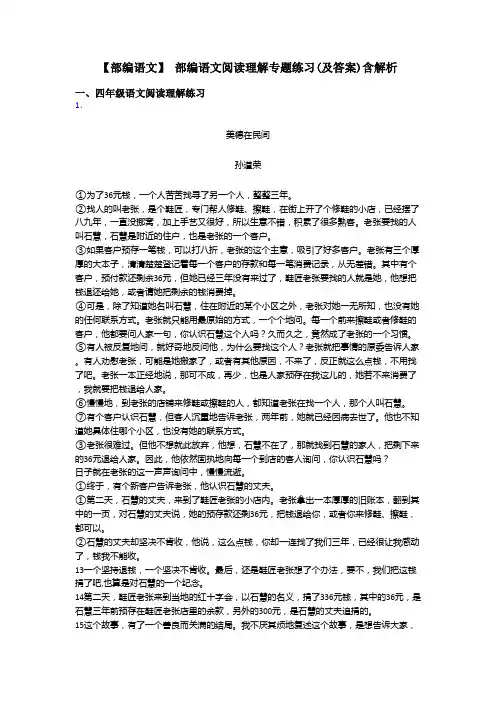
【部编语文】部编语文阅读理解专题练习(及答案)含解析一、四年级语文阅读理解练习1.美德在民间孙道荣①为了36元钱,一个人苦苦找寻了另一个人,整整三年。
②找人的叫老张,是个鞋匠,专门帮人修鞋、擦鞋,在街上开了个修鞋的小店,已经摆了八九年,一直没挪窝,加上手艺又很好,所以生意不错,积累了很多熟客。
老张要找的人叫石慧,石慧是附近的住户,也是老张的一个客户。
③如果客户预存一笔钱,可以打八折,老张的这个主意,吸引了好多客户。
老张有三个厚厚的大本子,清清楚楚登记着每一个客户的存款和每一笔消费记录,从无差错。
其中有个客户,预付款还剩余36元,但她已经三年没有来过了,鞋匠老张要找的人就是她,他想把钱退还给她,或者请她把剩余的钱消费掉。
④可是,除了知道她名叫石慧,住在附近的某个小区之外,老张对她一无所知,也没有她的任何联系方式。
老张就只能用最原始的方式,一个个地问。
每一个前来擦鞋或者修鞋的客户,他都要问人家一句,你认识石慧这个人吗?久而久之,竟然成了老张的一个习惯。
⑤有人被反复地问,就好奇地反问他,为什么要找这个人?老张就把事情的原委告诉人家。
有人劝慰老张,可能是她搬家了,或者有其他原因,不来了,反正就这么点钱,不用找了吧。
老张一本正经地说,那可不成,再少,也是人家预存在我这儿的,她若不来消费了,我就要把钱退给人家。
⑥慢慢地,到老张的店铺来修鞋或擦鞋的人,都知道老张在找一个人,那个人叫石慧。
⑦有个客户认识石慧,但客人沉重地告诉老张,两年前,她就已经因病去世了。
他也不知道她具体住哪个小区,也没有她的联系方式。
③老张很难过。
但他不想就此放弃,他想,石慧不在了,那就找到石慧的家人,把剩下来的36元退给人家。
因此,他依然固执地向每一个到店的客人询问,你认识石慧吗?日子就在老张的这一声声询问中,慢慢流逝。
①终于,有个新客户告诉老张,他认识石慧的丈夫。
①第二天,石慧的丈夫,来到了鞋匠老张的小店内。
老张拿出一本厚厚的旧账本,翻到其中的一页,对石慧的丈夫说,她的预存款还剩36元,把钱退给你,或者你来修鞋、擦鞋,都可以。
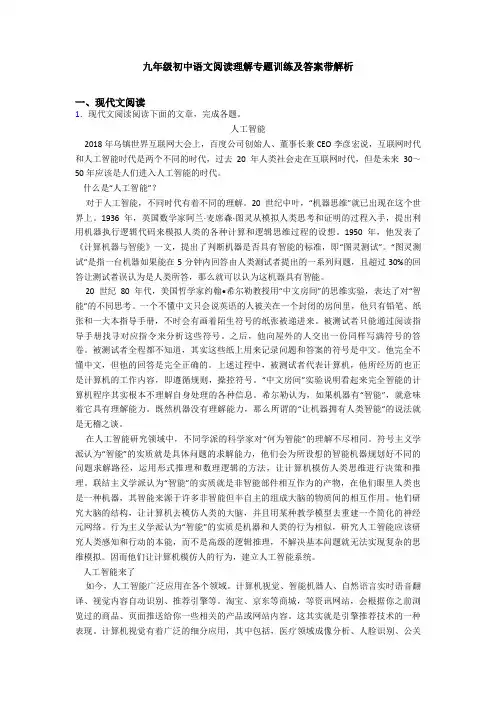
九年级初中语文阅读理解专题训练及答案带解析一、现代文阅读1.现代文阅读阅读下面的文章,完成各题。
人工智能2018年乌镇世界互联网大会上,百度公司创始人、董事长兼CEO李彦宏说,互联网时代和人工智能时代是两个不同的时代,过去20年人类社会走在互联网时代,但是未来30~50年应该是人们进入人工智能的时代。
什么是“人工智能”?对于人工智能,不同时代有着不同的理解。
20世纪中叶,“机器思维”就已出现在这个世界上。
1936年,英国数学家阿兰·麦席森·图灵从模拟人类思考和证明的过程入手,提出利用机器执行逻辑代码来模拟人类的各种计算和逻辑思维过程的设想。
1950年,他发表了《计算机器与智能》一文,提出了判断机器是否具有智能的标准,即“图灵测试”。
“图灵测试”是指一台机器如果能在5分钟内回答由人类测试者提出的一系列问题,且超过30%的回答让测试者误认为是人类所答,那么就可以认为这机器具有智能。
20世纪80年代,美国哲学家约翰•希尔勒教授用“中文房间”的思维实验,表达了对“智能”的不同思考。
一个不懂中文只会说英语的人被关在一个封闭的房间里,他只有铅笔、纸张和一大本指导手册,不时会有画着陌生符号的纸张被递进来。
被测试者只能通过阅读指导手册找寻对应指令来分析这些符号。
之后,他向屋外的人交出一份同样写满符号的答卷。
被测试者全程都不知道,其实这些纸上用来记录问题和答案的符号是中文。
他完全不懂中文,但他的回答是完全正确的。
上述过程中,被测试者代表计算机,他所经历的也正是计算机的工作内容,即遵循规则,操控符号。
“中文房间”实验说明看起来完全智能的计算机程序其实根本不理解自身处理的各种信息。
希尔勒认为,如果机器有“智能”,就意味着它具有理解能力。
既然机器没有理解能力,那么所谓的“让机器拥有人类智能”的说法就是无稽之谈。
在人工智能研究领域中,不同学派的科学家对“何为智能”的理解不尽相同。
符号主义学派认为“智能”的实质就是具体问题的求解能力,他们会为所设想的智能机器规划好不同的问题求解路径,运用形式推理和数理逻辑的方法,让计算机模仿人类思维进行决策和推理。
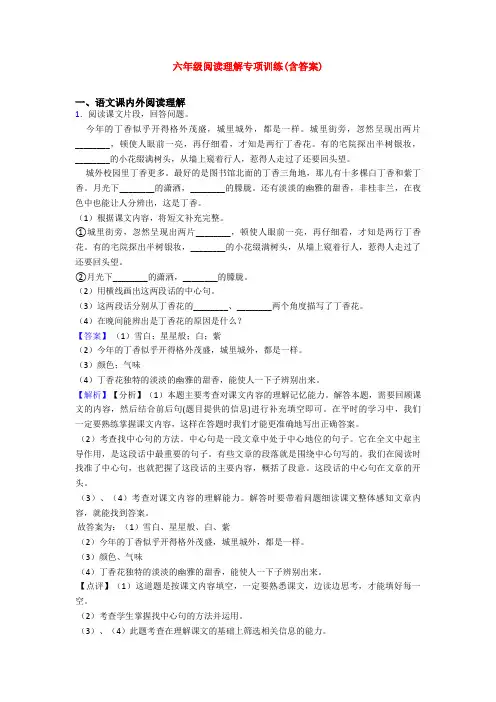
六年级阅读理解专项训练(含答案)一、语文课内外阅读理解1.阅读课文片段,回答问题。
今年的丁香似乎开得格外茂盛,城里城外,都是一样。
城里街旁,忽然呈现出两片________,顿使人眼前一亮,再仔细看,才知是两行丁香花。
有的宅院探出半树银妆,________的小花缀满树头,从墙上窥着行人,惹得人走过了还要回头望。
城外校园里丁香更多。
最好的是图书馆北面的丁香三角地,那儿有十多棵白丁香和紫丁香。
月光下________的潇洒,________的朦胧。
还有淡淡的幽雅的甜香,非桂非兰,在夜色中也能让人分辨出,这是丁香。
(1)根据课文内容,将短文补充完整。
①城里街旁,忽然呈现出两片________,顿使人眼前一亮,再仔细看,才知是两行丁香花。
有的宅院探出半树银妆,________的小花缀满树头,从墙上窥着行人,惹得人走过了还要回头望。
②月光下________的潇洒,________的朦胧。
(2)用横线画出这两段话的中心句。
(3)这两段话分别从丁香花的________、________两个角度描写了丁香花。
(4)在晚间能辨出是丁香花的原因是什么?【答案】(1)雪白;星星般;白;紫(2)今年的丁香似乎开得格外茂盛,城里城外,都是一样。
(3)颜色;气味(4)丁香花独特的淡淡的幽雅的甜香,能使人一下子辨别出来。
【解析】【分析】(1)本题主要考查对课文内容的理解记忆能力。
解答本题,需要回顾课文的内容,然后结合前后句(题目提供的信息)进行补充填空即可。
在平时的学习中,我们一定要熟练掌握课文内容,这样在答题时我们才能更准确地写出正确答案。
(2)考查找中心句的方法。
中心句是一段文章中处于中心地位的句子。
它在全文中起主导作用,是这段话中最重要的句子。
有些文章的段落就是围绕中心句写的。
我们在阅读时找准了中心句,也就把握了这段话的主要内容,概括了段意。
这段话的中心句在文章的开头。
(3)、(4)考查对课文内容的理解能力。
解答时要带着问题细读课文整体感知文章内容,就能找到答案。
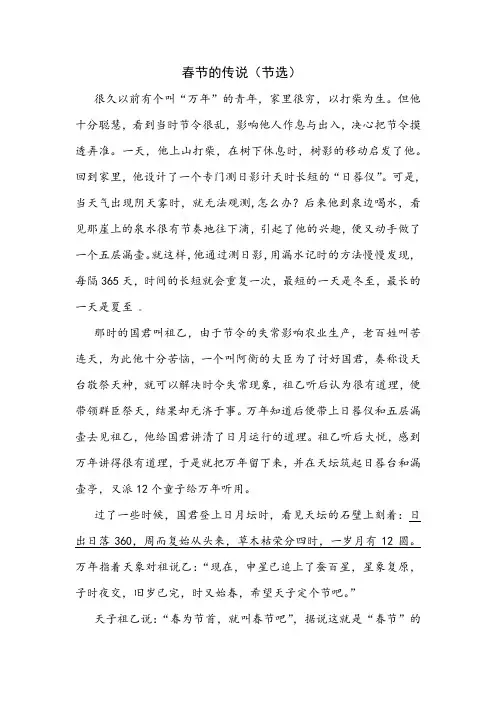
春节的传说(节选)很久以前有个叫“万年”的青年,家里很穷,以打柴为生。
但他十分聪慧,看到当时节令很乱,影响他人作息与出入,决心把节令摸透弄准。
一天,他上山打柴,在树下休息时,树影的移动启发了他。
回到家里,他设计了一个专门测日影计天时长短的“日晷仪”。
可是,当天气出现阴天雾时,就无法观测,怎么办?后来他到泉边喝水,看见那崖上的泉水很有节奏地往下滴,引起了他的兴趣,便又动手做了一个五层漏壶。
就这样,他通过测日影,用漏水记时的方法慢慢发现,每隔365天,时间的长短就会重复一次,最短的一天是冬至,最长的一天是夏至。
那时的国君叫祖乙,由于节令的失常影响农业生产,老百姓叫苦连天,为此他十分苦恼,一个叫阿衡的大臣为了讨好国君,奏称设天台敬祭天神,就可以解决时令失常现象,祖乙听后认为很有道理,便带领群臣祭天,结果却无济于事。
万年知道后便带上日晷仪和五层漏壶去见祖乙,他给国君讲清了日月运行的道理。
祖乙听后大悦,感到万年讲得很有道理,于是就把万年留下来,并在天坛筑起日晷台和漏壶亭,又派12个童子给万年听用。
过了一些时候,国君登上日月坛时,看见天坛的石壁上刻着:日出日落360,周而复始从头来,草木枯荣分四时,一岁月有12圆。
万年指着天象对祖说乙:“现在,申星已追上了蚕百星,星象复原,子时夜交,旧岁已完,时又始春,希望天子定个节吧。
”天子祖乙说:“春为节首,就叫春节吧”,据说这就是“春节”的由来。
(选自《春节文化》李英儒山西古籍出版社有删减)1.从文中找出合适的词语填空。
不断叫苦,形容十分痛苦、烦恼。
()对事情没有什么帮助或益处。
比喻不解决问题。
()2.根据短文下列说法不正确的是()。
A.万年虽然家里穷,但他很聪慧。
B.万年发明了日晷仪和五层漏壶可以让节令正常起来。
C.大臣阿衡的做法也可以解决节令失常的现象。
D.“子时夜交,旧岁已完,时又始春”指的是旧年已经结束,新的一年即将开始。
3.说说文中画线句子的意思。
4. 读了短文,你知道春节的由来了吗?春节文化的生活德育智慧(节选)赵丽娟春节作为沿袭传统农耕生活的节日,其最原始的意义是在岁末年初之时,将经过一年辛勤农业劳动收获的物品祭祀众神及祖先,感谢大自然的恩赐,祈求神灵和祖先的庇佑,渴望新的一年生活幸福、吉祥。
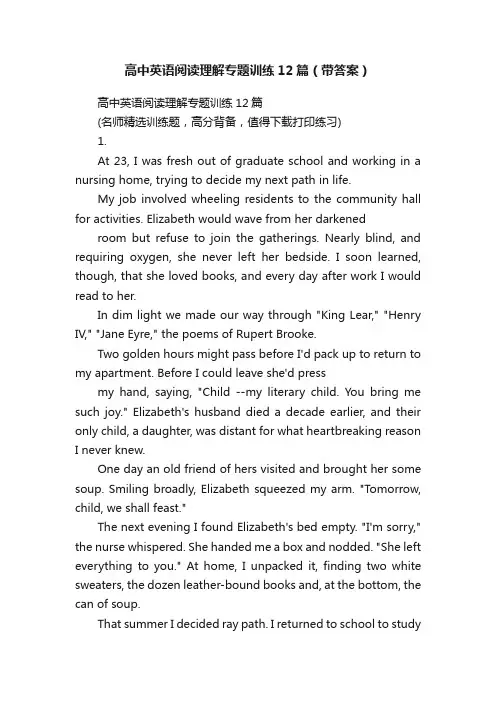
高中英语阅读理解专题训练12篇(带答案)高中英语阅读理解专题训练12篇(名师精选训练题,高分背备,值得下载打印练习)1.At 23, I was fresh out of graduate school and working in a nursing home, trying to decide my next path in life.My job involved wheeling residents to the community hall for activities. Elizabeth would wave from her darkened room but refuse to join the gatherings. Nearly blind, and requiring oxygen, she never left her bedside. I soon learned, though, that she loved books, and every day after work I would read to her.In dim light we made our way through "King Lear," "Henry IV," "Jane Eyre," the poems of Rupert Brooke.Two golden hours might pass before I'd pack up to return to my apartment. Before I could leave she'd pressmy hand, saying, "Child --my literary child. You bring me such joy." Elizabeth's husband died a decade earlier, and their only child, a daughter, was distant for what heartbreaking reason I never knew.One day an old friend of hers visited and brought her some soup. Smiling broadly, Elizabeth squeezed my arm. "Tomorrow, child, we shall feast."The next evening I found Elizabeth's bed empty. "I'm sorry," the nurse whispered. She handed me a box and nodded. "She left everything to you." At home, I unpacked it, finding two white sweaters, the dozen leather-bound books and, at the bottom, the can of soup.That summer I decided ray path. I returned to school to studyliterature.And for 26 years the soup has stayed in my kitchen. It's remained unopened and now is rusted (生锈的). But the memories are preserved.24. Why did Elizabeth refuse to join the gatherings?A. She had many books to read.B. She was not a very social person.C. She was restricted in her movement.D. She had no interest in those activities.25. What do we know about Elizabeth?A. She loved writing poems.B. She often visited her friends.C. She got divorced ten years ago.D. She had little contact with her daughter.26. Which is correct to best describe the author according to the text?A. She used to be doctor.B. She was inspired by Elizabeth.C. She taught literature for 26 years.D. She didn't like the taste of the soup.27. What is the best title for the passage?A. A book-loving friendB. An unforgettable literary journeyC. An interesting nursing experienceD. A short-term job and its lifelong impact2.and sat down. Before he ordered, he couldn't helpA handsome middle-aged man walked quietly into the cafébut noticed a group of younger men at the table next to him. It was obvious they were making fun of somethingabout him and it wasn't until he remembered he was wearing a small pink ribbon(丝带) on the lapel of his suit that he became aware of what the joke was all about.The man pretended not to notice it, but the whisper and laughter began to get to him. He looked one of therude young men straight into the eye, placed his hand beneath the ribbon and asked, "This?"With that the young men all began to laugh out loud. The man he spoke to said, "Hey, sorry, man, but we were just commenting on how pretty your little pink ribbon looks against your blue jacket!"The middle-aged man calmly invited the joker to come over to his table, and politely seated him. As uncomfortable as he was, the young guy had to, not really sure why. In a soft voice, the middle-aged man said, "I wear this ribbon to bring awareness about breast cancer. I wear it in my mother's honor.""Oh, sorry. She died of breast cancer?""No, she didn't. She's alive and well. But her breasts nourished me as a baby, and were a soft resting place for my head when I was scared or lonely as a little boy. I'm very grateful for my mother's breasts, and her health.""Umm," the young replied, "yeah.""And I wear this ribbon to honor my wife," the man continued."And she's okay, too?" the young guy asked."Oh, yes. She's fine. Her breasts have been a great source of loving pleasure for both of us, and with them she nurtured and nourished our daughter 23 years ago. I'm grateful for my wife's breasts, and her health.""Uh, huh. And I guess you wear it to honor your daughter,also?""No. It's too late to honor my daughter by wearing it now ……"Shaken and ashamed, the young guy said, "Oh, I'm so sorry, mister.""So, in my daughter's memory, too, I proudly wear this little ribbon, which allows me the opportunity toWith this, he reached in his pocket and handed the young man a little pink ribbon. enlighten others. And here…"The young guy looked at it, slowly raised his head and asked, "……?"59. The young men joked about the middle-aged man's _____.A. looksB. ribbonC. attitudeD. clothes60. What may have happened to the man's daughter?A. She died of breast cancer.B. She was ill with cancer.C. She had gone abroad.D. She got married.61. What will the young man probably ask?A. May I give it to my mother?B. Can you help me put it on?C. Will you please forgive me?D. Shall we have some drink together?62. What is the best title for the passage?A. An Unusual Meeting.B. An Impressive Lesson.C. Be Grateful to Your Beloved.D. Little Pink Ribbon3.I set out to help clean up the beach after a violent storm a year ago. The sight I saw was heartbreaking. The broken houses seemed to be weeping quietly. I couldn't describe how I felt. But something special among the debris (废墟) turned my day around.I joined a club to clean up the beach after the storm last November. As I removed the debris from the beach, I noticed an object with shiny buttons in the wet sand. It was a jacket, and I was excited since Halloween was coming and I thought I had found a great costume. After picking it up, I was able to see that the jacket was from West Point (西点军校), the United States Military Academy, and it had the name "deGavre" written inside.I realized the jacket might be important to someone. I decided to find the jacket's owner and return it.I called the West Point Museum, considering that if the family couldn't be found, the jacket should go there.The museum connected me with Kim McDermott, Director of Communications for the Academy's Association of Graduates. Kim soon ensured that the jacket had belonged to Chester Braddock deGavre, who was a 1933 graduate and a war hero, but passed away in 1993.I sent Kim a photo of the jacket and she posted it to the West Point Association of Graduates Facebook Page, asking if anyone could help us find the family. In less than two hours, someone had found and called the hero's wife, Teresa. Soon I started to receive personal messages from members of the deGavre family, their friends and others who were touched by the story and they found me on Facebook.Finding Chester deGavre's jacket and connecting to his familywith the help of Facebook have been someaningful to me. I've formed a bond with amazing peopleI might have never met.4. Seeing the sight after the storm, the author felt very ________.A. sadB. surprisedC. nervousD. disappointed5. What did the author think at first after he saw the jacket?A. He should try to find its owner.B. He could wear it for Halloween.C. He should return it to West Point.D. He could send it to others for free.6. Why did the author call the West Point Museum?A. Because the jacket was made there.B. Because the jacket's owner worked there.C. Because the workers there needed the jacket.D. Because the jacket might be collected by the museum.7. According to the text, who was Kim McDermott?A. He happened to be the owner of the jacket.B. He was a student graduating from West Point.C. He was someone who could find a record of the graduates.D. He was a family member of the author.4.Times are a little tough at our house right now. Neither of us makes a lot of money, but years of experience have taught us how to walk between the raindrops and make it from one month to the next with a fair amount of grace. I cook a lot at home, more when we're facing lean times. When I know that I have to keep usfed on notmuch money, I fall back on my grandmother's recipes. She taught me to cook.When I was a kid, my twin brother and I spent long summer weeks and Christmas vacations with my mother's parents in the mountains of North Carolina. Rather than go hunting with my grandfather on frozen mornings, I found myself more and more in the kitchen with my grandmother, watching her making a lemon cheese pie with her soft hands.My great-grandmother died when my grandmother was 11 years old. As the eldest daughter, she was expected to take on all of the housework while attending school. Throughout the Great Depression, she learned how to makea little food go a long way. Vegetables were cheap, so she cooked a lot of them, mostly only using small amounts of meat for seasoning. Roast beef was a twice-a-month luxury, but there was nothing she couldn't do with a chicken, every part of it. Nothing went to waste.Now I understand that her food was sacred. I feel connected to my grandmother and to hundreds of years offamily when I'm in my kitchen making country food. In the delicious smells is a long tale of victory over hard times, of conquering starvation--of not just surviving, but finding joy and pleasure in every meal of every day.From grandmother I learned to take real satisfaction in feeding people. My grandmother would beam withpleasure over a heavily laden table and say, "Do you know what this would cost at the restaurant?" I never knew what restaurant in particular she had in mind, but I knew that the question was totally not fair, because no restaurantanywhere can cook like a grandmother. But now, thanks to her guidance and years of practice, I can.28. According to the passage, the author cooks a lot at home because__________.A. she wants to try out her grandmother's recipesB. she and her husband are quite particular about foodC. she enjoys cooking at homeD. she and her husband are embarrassed financially29. What does the underlined word "lean" mean in the first paragraph?A. with a bad harvestB. with little moneyC. with little energyD. with little work30. According to the passage, the author's grandmother__________.A. learnt to cook throughout the Great DepressionB. was careful in budgetingC. preferred chicken to beefD. was careful in cooking vegetables31. Which of the following can be the best title of the passage?A. Cook like My GrandmotherB. My Grandmother's Sacred FoodC. My Grandmother's RecipeD. Joy and Pleasure in Cooking5."Joe? Is that you?" The woman speaking to me at the baseball game looked a little familiar. "Marci?" I asked."It IS you !" she cried out, smiling broadly. "Gosh, it's good tosee you again !"It was good to see Marci, too. Off and on during the past few decades, I've wondered about her. I almost triedto search for her a few years ago after talking to a friend who had indicated that the 1990s had been pretty rough for Marci. So meeting her at the baseball game was really out of expectation.We spent a few minutes talking about our lives—the good old, bad old days. Then Marci grew quiet for a moment. "You know, Joe," she said, " I've always wanted to tell you…how…how sorry I am for the way I tr you. You must have been hurt both physically and mentally." I was a little embarrassed. I turned and looked at her."It's OK," I said, "No big deal!" "But I was such a jerk," she continued. Yes you were, I thought. "We were bothpretty young," I smiled. "I know." she said, "It's just always bothered me, remembering how mean I was to you.And I've wanted to tell you that I'm sorry."The expression on her face was warm and sincere. And there was something in her eyes—it looked a lot like relief. "OK," I said. "Apology accepted!" Overcome by the sweetness of the moment, I reached an arm around herand gave her a quick hug. Just then, the crowd erupted with a huge cheer, and Marci and I both returned our attention to the game. By the time I looked over to where she had been, she was gone. But the warm, wonderful feeling of our brief exchange was still there, and continues to this day whenever I think about it.It isn't enough to just say "I'm sorry" and "You're forgiven." But when those words are truly felt and sincerely expressed, they can open the door to miracles of the heart. Forgiveness can bringpeace to an injured soul—even years after the fact. Even at a baseball game.21. What kind of life did Marci live during the late 20th century according to the passage?A. Happy.B. Busy.C. Hard.D. Simple.22. What does the underlined word "jerk" in the third paragraph mean?A. A humorous person.B. A cruel person.C. A careless person.D. An honest person.23. Why did Marci look in relief after talking with the author?A. Because her favorite tea m won the game.B. Because she learned Joe was living a good life.C. Because she made an apology to the author.D. Because she found she was not mean any longer.24. What might be the best title for the passage?A. Excitement of a Baseball GameB. Mental Burden of a WomanC. Miracles of ForgivenessD. Relief of Finding a friend6.John Blanchard stood up from the bench, straightened his army uniform, and studied the crowd of people making their way through Grand Central Station. He looked for the girl whose heart he knew, but whose face hedidn't, the girl with the rose.His interest in her had begun thirteen months before in a Florida library. Taking a book off the shelf he found himself intrigued, not with the words of the book, but with the notes penciled in the margin. The soft handwritingreflected a thoughtful soul and insightful mind. In the front of the book, he discovered the previous owner's name, Miss Hollis Maynell. With time and effort he located her address. She lived in New York City. He wrote her a letter introducing himself and inviting her to correspond. The next day he was shipped overseas for service in World War II.During the next year and one month the two grew to know each other through mail. Each letter was a seed falling on a fertile heart. A romance was budding. Blanchard requested a photograph, but she refused. She felt thatif he really cared, it wouldn't matter what she looked like.When the day finally came for him to return from Europe, they scheduled their first meeting --7:00 PM at the Great Central Station in New York. "You'll recognize me," she wrote, "by the red rose I'll be wearing on my lapel."So at 7:00 he was in the station looking for a girl whose heart he loved, but whose face he'd never seen.I'll let Mr. Blanchard tell you what happened: A young woman was coming toward me, and her figure long and slim. Her blonde hair lay back in curls from her delicate ears; her eyes were blue as flowers. Her lips and chin had a gentle firmness, and in her pale green suit she was like springtime come alive. I started toward her, entirely forgetting to notice that she was not wearing a rose. As I moved, a small, attractive smile curved her lips. "Going my way, sailor?" she murmured.Almost uncontrollably I made one step closer to her, andthen I saw Hollis Maynell. She was standing almost directly behind the girl. A woman well past 40, she had graying hair tucked under a worn hat. She was more than plump, her thick-ankled feet thrust into low-heeled shoes. The girl in the green suit was walking quickly away. I feltas though I was split in two, so keen was my desire to follow her, and yet so deep was my longing for the woman whose spirit had truly accompanied me and upheld my own.And there she stood Her pale,plump face was gentle and sensible, her gray eyes had a warm and kindly twinkle. I did not hesitate. My fingers gripped the small worn blue leather copy of the book that was to identify meto her.This would not be love, but it would be something precious, something perhaps even better than love, a friendship for which I had been and must ever be grateful. I squared my shoulders and saluted and held out thebook to the woman, even though while I spoke I felt choked by the bitterness of my disappointment. I'm Lieutenant (中尉)John Blanchard,and you must be Miss Maynell. I am so glad you could meet me; may I take you to dinner?"The woman's face broadened into a tolerant smile. "I don't know what this is about, son," she answered, "butthe young lady in the green suit who just went by, she begged me to wear this rose on my coat And she said if you were to ask me out to dinner, I should go and tell you that she is waiting for you in the big restaurant across thestreet She said it was some kind of test!"It's not difficult to understand and admire Miss Maynell's wisdom. The true nature of a heart is seen in its response to theunattractive, "Tell me whom you love," Houssaye wrote, "And I will tell you who you are."65. The underlined phrase "intrigued" in Paragraph 2 means "______" .A. satisfied withB. fascinated byC. encouraged byD. frustrated with66. How did John Blanchard know of Miss Hollis Maynell?A. They lived in the same city.B. They were both interested in literature.C. John came across Hollis in a Florida library.D. John knew Hollis's name from a library book.67. Hollis refused to send Blanchard a photo because _____ .A. she bought true love is beyond appearanceB. she wasn't confident about her appearanceC. she was only a middle-aged womanD. she had never taken any photo before they knew68. What was the real Miss Hollis Maynell like?A. She was a plump woman with graying hair.B. She was a slightly fat girl, with blonde hairC. She was a young, pretty girl wearing a green suitD. She was a middle-aged woman in her forties.69. When Blanchard went over to greet the woman, he was_____ .A. disappointed but well-behavedB. excited and confidentC. annoyed and bad-manneredD. shocked but inspired70. Which of the following can be the best title for thepassage?A. Don't Judge a Book by its CoverB. The Symbol of RoseC. Love is BlindD. A Test of Love7.I went to the Tsavo National Park in northern Kenya for a film. We set off early for a distant water hole. Ahuge elephant covered with dry mud, drank calmly and deeply. He might have traveled 50 km to reach the water.He wasn't going to hurry now. We thought that he'd drink a while and rest in the shade, and then drink again. What actually happened was that he drank deeply and stepped away. Then he suddenly fell down. Within minutes he was dead.We called animal doctor Jeremiah Poghon immediately. He removed the head of a poisoned arrow from the elephant's body, and let out over 100 liters of pus(脓)--the result of the elephant's meeting with a poacher months ago.Today's poacher shoots from a distance. An arrow, covered with poison, is fired into the body of an elephant. If the poacher is lucky, the elephant might die in an hour or two; if not, he might have to follow the elephant for days before it dies. Often the arrow head fails to kill the elephant at once-- it doesn't mean the poison won't finally killthe elephant, but it will be a slow death.Living in Tsavo through these times, I could see the results of poaching from time to time. When I think aboutthe death of that elephant, what stays with me is the extraordinary silence after the shocking sound of his body hitting the ground. I took some comfort from the knowledge that as thedead body returned to the soil, some animals would benefit-- but I couldn't escape the feeling that with the death of such a large animal, the world seemed to be a poorer and emptier place.24. While filming near the water hole, the author and his team ______.A. knew the elephant was injuredB. found the elephant acted violentlyC. tried their best to save the elephantD. thought the elephant was in good condition25. According to the passage, the underlined word "poacher" is probably ______.A. A hunter who kills or catches animals illegallyB. A kind of fierce meat-eating animalC. A serious disease that can infect elephantsD. A kind of deadly poison26. Further examination showed that the dead elephant ______.A. had suffered a lotB. was killed by a poisonous needleC. had suffered an hour or twoD. had had a good fight with a poacher27. Why did the author write the article?A. To introduce the African elephant.B. To show the cruelty of poaching.C. To describe his filming experience.D. To ask readers to protect wild animals.8.Pete Richards was the loneliest man in town on the day that little Jean Grace opened the door of his shop.Pete's grandfather had owned the shop until his death. Thenthe shop became Pete's. The front window wasfull of beautiful old things: jewelry of a hundred years ago, gold and silver boxes, carved figures from China and Japan and other nations.On this winter afternoon, a child stood there, her face close to the window. With large and serious eyes, she studied each piece in the window. Then, looking pleased, she stepped back from the window and went into the shop. Pete himself stood behind the counter. His eyes were cold as he looked at the small girl. " Please," she began, " would you let me look at the pretty string of blue beads in the window?" Pete took the string of blue beads from the window. The beads were beautiful against his hand as he held the necklace up for her to see."They are just right," said the child as though she were alone with the beads. "Will you wrap them up in pretty paper for me, please? I've been looking for a really wonderful Christmas present for my sister."How much money do you have?" asked Pete.She put a handful of pennies on the counter. "This is all I have," she explained simply. "I've been saving the money for my sister's present. "Pete looked at her, his eyes thoughtful. Then he carefully closed his hand over the price mark on the necklace so that she could not see it. How could he tell her the price? The happy look in her big blue eyes struck him like the pain of an old wound."Just a minute," he said and went to the back of the shop. "What's your name?" he called out. He was very busy about something."Jean Grace," answered the child.When Pete returned to the front of the shop, he held apackage in his hand. It was v/rapped in pretty Christmas paper."There you are," he said. "Don't lose it on the way home. "She smiled happily at him as she ran out of the door. Through the window he watched her go. He felt more alone than ever.Something about Jean Grace and her string of beads had made him feel once more the pain of his old grief. The child's hair was as yellow as the sunlight; her eyes were as blue as the sea. Once upon a time, Pete had loved a girl with hair of that same yellow and with eyes just as blue. And the necklace of blue stones had been meant for her.But one rainy night, a car had gone off the road and struck the girl. After she died, Pete felt that he had nothing left in the world except his grief. The blue eyes of Jean Grace brought him out of that world of self-pity and made him remember again all that he had lost. The pain of remembering was so great that Pete wanted to run away from the happy Christmas shoppers who came to look at his beautiful old things during the next ten days.When the last shopper had gone, late on Christmas Eve, The door opened and a young woman came in. Pete could not understand it, but he felt that he had seen her before. Her hair was sunlight yellow and her eyes weresea-blue. Without speaking, she put on the counter a package wrapped in pretty Christmas paper. When Pete opened the package, the string of blue beads lay again before him.Did this come from your shop?" she asked.Pete looked at her with eyes no longer cold. "Yes, it did," he said."Are the stones real?""Yes. They aren't the best turquoise(绿松石), but they are real. ""Can you remember to whom you sold them?""She was a small girl. Her name was Jean. She wanted them for her sister's Christmas present. ""How much were they?""I can't tell you that," he said. "The seller never tells anyone else what a buyer pays. ""But Jean has never had more than a few pennies. How could she pay for them?""She paid the biggest price one can ever pay," he said.For a moment there was no sound in the little shop. Then somewhere in the city, church bells began to ring. It was midnight and the beginning of another Christmas Day."But why did you do it?" the girl asked.Pete put the package into her hands."There is no one else to whom I can give a Christmas present," he said. "It is already Christmas morning. Will you let me take you to your home? I would like to wish you a Merry Christmas at your door. "And so, to the sound of many bells, Pete Richards and a girl whose name he had not yet learned walked outinto the hope and happiness of a new Christmas Day.27. Pete did not say the price of the necklace because ______.A. the seller never tells anyone else what a buyer paysB. he priced the necklace too highC. he knew it would disappoint the girlD. he didn't want to sell the necklace28. The eyes of Jean Grace brought Pete out of his world of self-pity and he ______.A. tried to forget the memory of his sweetheartB. began to look at the world optimisticallyC. remembered his lost loveD. no longer felt the pain in him29. By saying "She paid the biggest price one can ever pay," Pete meant that Jean Grace_________.A. gave the most money for the necklaceB. gave all she had with her for the necklaceC. appreciated the value of the necklaceD. wanted to have the best thing in the shop30. At the end of the story we see that Pete _____ .A. found another girl that he could trustB. met someone who truly loved himC. found a place to go at lastD. regained his ability to love9.Martha had been working for Miller Laboratories for two years, but she was not happy there. Nothing significant had happened in the way of promotions or salary increases. Martha felt that her supervisor, a youngerand less experienced person than she, did not like her. In fact, the supervisor often said unpleasant things to her.One day, while talking with her friend Maria, she mentioned how discouraged she gave her the name of a cousin of hers who was director of Human Resources Department for a large chemical company. Martha called him the next day and set up an interview on her lunch hour.During the interview, Mr. Petri said, "You're just the kind of person we need here. You're being wasted in your other job. Give me a call in a day or two. I'm sure we can find a place for you in our organization." Martha was so happy she almost danced out of the building.。
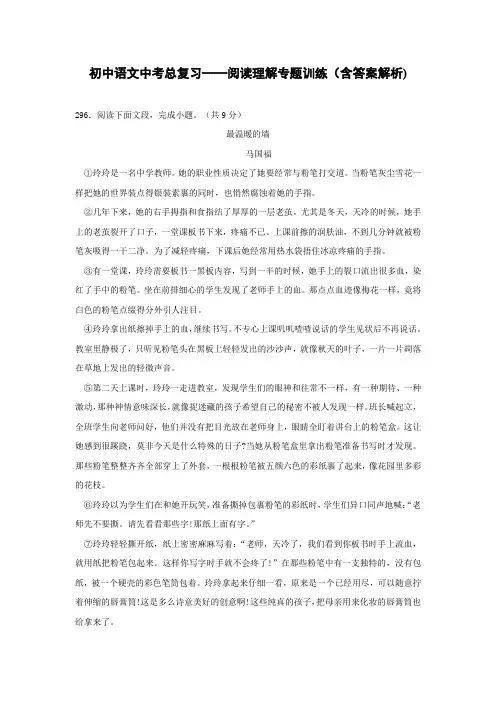
初中语文中考总复习——阅读理解专题训练(含答案解析)296.阅读下面文段,完成小题。
(共9分)最温暖的墙马国福①玲玲是一名中学教师。
她的职业性质决定了她要经常与粉笔打交道。
当粉笔灰尘雪花一样把她的世界装点得银装素裹的同时,也悄然腐蚀着她的手指。
②几年下来,她的右手拇指和食指结了厚厚的一层老茧。
尤其是冬天,天冷的时候,她手上的老茧裂开了口子,一堂课板书下来,疼痛不已。
上课前擦的润肤油,不到几分钟就被粉笔灰吸得一干二净。
为了减轻疼痛,下课后她经常用热水袋捂住冰凉疼痛的手指。
③有一堂课,玲玲需要板书一黑板内容,写到一半的时候,她手上的裂口流出很多血,染红了手中的粉笔。
坐在前排细心的学生发现了老师手上的血。
那点点血迹像梅花一样,竟将白色的粉笔点缀得分外引人注目。
④玲玲拿出纸擦掉手上的血,继续书写。
不专心上课叽叽喳喳说话的学生见状后不再说话。
教室里静极了,只听见粉笔头在黑板上轻轻发出的沙沙声,就像秋天的叶子,一片一片凋落在草地上发出的轻微声音。
⑤第二天上课时,玲玲一走进教室,发现学生们的眼神和往常不一样,有一种期待、一种激动,那种神情意味深长,就像捉迷藏的孩子希望自己的秘密不被人发现一样。
班长喊起立,全班学生向老师问好,他们并没有把目光放在老师身上,眼睛全盯着讲台上的粉笔盒。
这让她感到很蹊跷,莫非今天是什么特殊的日子?当她从粉笔盒里拿出粉笔准备书写时才发现。
那些粉笔整整齐齐全部穿上了外套,一根根粉笔被五颜六色的彩纸裹了起来,像花园里多彩的花枝。
⑥玲玲以为学生们在和她开玩笑,准备撕掉包裹粉笔的彩纸时,学生们异口同声地喊:“老师先不要撕。
请先看看那些字!那纸上面有字。
”⑦玲玲轻轻撕开纸,纸上密密麻麻写着:“老师,天冷了,我们看到你板书时手上流血,就用纸把粉笔包起来。
这样你写字时手就不会疼了!”在那些粉笔中有一支独特的,没有包纸,被一个硬壳的彩色笔筒包着。
玲玲拿起来仔细一看,原来是一个已经用尽,可以随意拧着伸缩的唇膏筒!这是多么诗意美好的创意啊!这些纯真的孩子,把母亲用来化妆的唇膏筒也给拿来了。
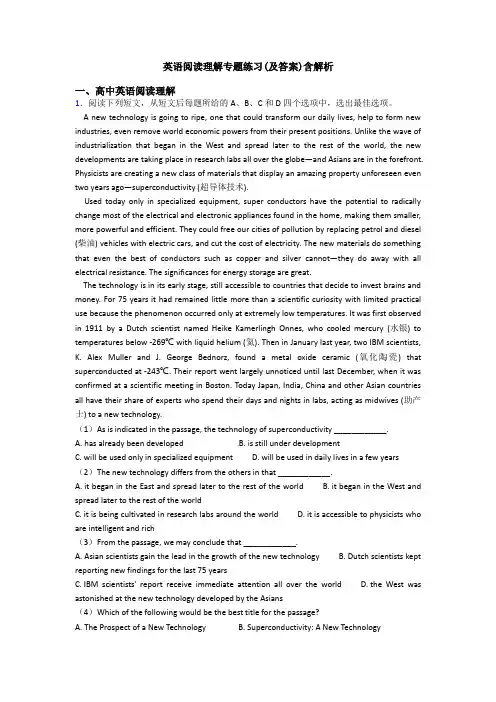
英语阅读理解专题练习(及答案)含解析一、高中英语阅读理解1.阅读下列短文,从短文后每题所给的A、B、C和D四个选项中,选出最佳选项。
A new technology is going to ripe, one that could transform our daily lives, help to form new industries, even remove world economic powers from their present positions. Unlike the wave of industrialization that began in the West and spread later to the rest of the world, the new developments are taking place in research labs all over the globe—and Asians are in the forefront. Physicists are creating a new class of materials that display an amazing property unforeseen even two years ago—superconductivity (超导体技术).Used today only in specialized equipment, super conductors have the potential to radically change most of the electrical and electronic appliances found in the home, making them smaller, more powerful and efficient. They could free our cities of pollution by replacing petrol and diesel (柴油) vehicles with electric cars, and cut the cost of electricity. The new materials do something that even the best of conductors such as copper and silver cannot—they do away with all electrical resistance. The significances for energy storage are great.The technology is in its early stage, still accessible to countries that decide to invest brains and money. For 75 years it had remained little more than a scientific curiosity with limited practical use because the phenomenon occurred only at extremely low temperatures. It was first observed in 1911 by a Dutch scientist named Heike Kamerlingh Onnes, who cooled mercury (水银) to temperatures below -269℃ with liquid helium (氦). Then in January last year, two IBM scientists, K. Alex Muller and J. George Bednorz, found a metal oxide ceramic (氧化陶瓷) that superconducted at -243℃. Their report went largely unnoticed until last December, when it was confirmed at a scientific meeting in Boston. Today Japan, India, China and other Asian countries all have their share of experts who spend their days and nights in labs, acting as midwives (助产士) to a new technology.(1)As is indicated in the passage, the technology of superconductivity ____________. A. has already been developed B. is still under developmentC. will be used only in specialized equipmentD. will be used in daily lives in a few years(2)The new technology differs from the others in that ____________.A. it began in the East and spread later to the rest of the worldB. it began in the West and spread later to the rest of the worldC. it is being cultivated in research labs around the worldD. it is accessible to physicists who are intelligent and rich(3)From the passage, we may conclude that ____________.A. Asian scientists gain the lead in the growth of the new technologyB. Dutch scientists kept reporting new findings for the last 75 yearsC. IBM scientists' report receive immediate attention all over the worldD. the West was astonished at the new technology developed by the Asians(4)Which of the following would be the best title for the passage?A. The Prospect of a New TechnologyB. Superconductivity: A New TechnologyC. A New Technology: The Key to Change the Way of Our LivesD. A New Technology: A Joint Effort of Many Countries【答案】(1)B(2)C(3)A(4)B【解析】【分析】本文是一篇说明文,介绍了超导体技术的发展潜能和发展状况。
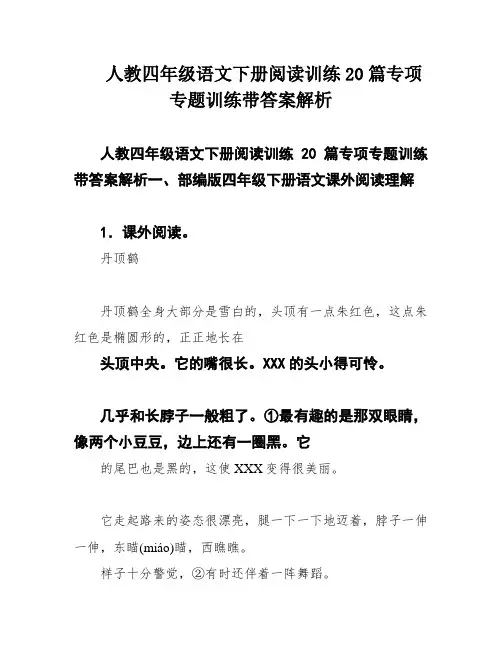
人教四年级语文下册阅读训练20篇专项专题训练带答案解析人教四年级语文下册阅读训练20篇专项专题训练带答案解析一、部编版四年级下册语文课外阅读理解1.课外阅读。
丹顶鹤丹顶鹤全身大部分是雪白的,头顶有一点朱红色,这点朱红色是椭圆形的,正正地长在头顶中央。
它的嘴很长。
XXX的头小得可怜。
几乎和长脖子一般粗了。
①最有趣的是那双眼睛,像两个小豆豆,边上还有一圈黑。
它的尾巴也是黑的,这使XXX变得很美丽。
它走起路来的姿态很漂亮,腿一下一下地迈着,脖子一伸一伸,东瞄(miáo)瞄,西瞧瞧。
样子十分警觉,②有时还伴着一阵舞蹈。
它休息时更是好看,它用个“金鸡独立”的架势,一条腿着地,另一条腿蜷起,亭亭玉立。
不过长脖子不能歇,仍旧四处张望,窥探动静。
丹顶鹤真有意思!(1)用波浪线画出短文的中心句。
(2)本文的结构是(。
)。
A.总—分B.分—总C.总—分—总(3)理解短文内容,说说短文是从哪几方面描写丹顶鹤的,用简洁的语言概括。
①________②________③________(4)句子赏析。
①句①运用了________的修辞方法,写出了丹顶鹤________的特点。
②句②运用了________的修辞方法,写出了丹顶鹤________的特点。
(5)说说本文表达了作者怎样的思想感情。
解析:(1)丹顶鹤真有意思!(2)B(3)丹顶鹤外形美丽;丹顶鹤走路姿态优雅;XXX休息时更好看。
(4)比喻;眼睛有趣;拟人;姿态优美(5)本文表达了作者对丹顶鹤的喜爱之情。
【解析】【分析】(1)考查找中心句的方法。
中心句是一段文章中处于中心地位的句子。
它在全文中起主导作用,是这段话中最重要的句子。
文章的段落就是围绕中心句写的。
我们在阅读时找准了中心句,也就把握了这段话的主要内容,概括了段意。
这段话的中心句在结尾。
(2)解答时要带着问题读短文整体感知文章内容可知,选段说先总的概括然后再详细逐点描写最后再总的概括,即“总—分—总”结构。
一、阅读理解1.课外阅读轩。
_______________________钻石,我们都知道它是天然矿物中硬度最高的物质。
为此,有一段时间我就想,不知道是怎样特别的结构,使它如此坚硬和神奇。
也正是带着这样的好奇心,我查了一下钻石的化学成分和结构,才知道钻石的化学成分是碳,它是宝石中唯一由单一元素组成的,属等轴晶系。
简单地说,钻石是在地球内部高压、高温条件下形成的一种由碳元素组成的单质晶体。
相反,其他材料都达不到这样的纯度。
也正因为这样,钻石才有了其他物质所没有的硬度。
那么,接着就又有一个问题了,靠什么来切割打磨如此坚硬的物质呢?答案让我感到很意外,靠另一颗钻石。
想想也对,如此坚硬的物质,也只有靠自己来打磨自己了。
正如毕淑敏说过的一句话:钻石自己敲打自己,是为了更完美。
也正因为这样,钻石才会拥有坚硬的外表和耀眼的光彩,也才会让世人喜爱。
其实,这正是钻石的品格。
钻石的形成可以说是非常不容易,它深埋于地下,经过多少年高温、高压慢慢变化,最后在某一时刻随火山熔岩喷涌而出,又被泥沙夹带,接受风吹雨淋的考验,又经过多少年,才可能有幸被识货的人发现,才有可能变成一块儿真正的钻石毛料,再经过慢慢加工、打磨,才能渐渐地显现出光彩华美的一面。
在这漫长的过程中,既有长久深埋的寂寞,又有无人赏识的孤独,更有最后加工过程中经受的种种痛苦和磨难。
也正因为这一切,最终钻石才成为一颗真正的钻石,实现了自己的价值。
做人也是一样的,人们常说吃得苦中苦,方为人上人。
只是我们许多人只看到了别人成功的一面,却没有看到别人经受磨炼的一面。
一个人如果有了钻石一样的品格,能吃苦,不怕吃苦,靠自己打磨自己,只要能坚持下来,也许某一天你的光环会被更多的人发现,你也会被更多的人赏识。
只是,我们现在的许多人,总是羡慕钻石的完美和价值,却不知道学习钻石的优秀品质。
为此,我们每个人都该多一些钻石的品质。
(1)给短文选择一个恰当的题目,应是()。
A. 钻石的品格B. 天然矿物——钻石C. 钻石的硬度D. 神奇的钻石(2)钻石是一种怎样的物质?请用文中的话对它作一个适当的解释。
六年级上册阅读理解专项训练(含答案)一、语文课内外阅读理解1.阅读课文,回答问题。
未知生命起源生命的起源与演化是和宇宙的起源与演化密切相关的。
生命的构成元素如碳、氢、氧、氮、磷、硫等是来自“大爆炸”后元素的演化。
资料表明前生物阶段的化学演化并不局限于地球,在宇宙空间中广泛地存在着化学演化的产物。
在星际演化中,某些生物单分子,如氨基酸、嘌呤、嘧啶等可能形成于星际尘埃或凝聚的星云中,接着在行星表面的一定条件下产生了像多肽、多聚核苷酸等生物高分子。
通过若干前生物演化的过渡形式最终在地球上形成了最原始的生物系统,即具有原始细胞结构的生命。
至此,生物学的演化开始,直到今天地球上产生了无数复杂的生命形式。
38亿年前,地球上形成了稳定的陆块,各种证据表明液态的水圈是热的,甚至是沸腾的。
现生的一些极端嗜热的古细菌和甲烷菌可能最接近于地球上最古老的生命形式,其代谢方式可能是化学无机自养。
澳大利亚西部瓦拉伍那群中35亿年前的微生物可能是地球上最早的生命证据。
原始地壳的出现,标志着地球由天文行星时代进入地质发展时代,具有原始细胞结构的生命也开始逐渐形成。
但是在很长的时间内尚无较多的生物出现,一直到距今 5.4亿年前的寒武纪,带壳的后生动物才大量出现,故把寒武纪以后的地质时代称为显生宙。
(1)写出下列词语的反义词。
密切——________ 复杂——________ 沸腾——________(2)生命的构成元素有________、________、________、________、________、________等,它们来自于“________”后元素的演化。
(3)标志着地球由天文行星时代进入地质发展时代的是________。
(4)写出本文的中心句________。
(5)写出下面句子所用的修辞方法。
①一直到距今5.4亿年前的寒武纪,带壳的后生动物才大量出现,故把寒武纪以后的地质时代称为显生宙。
________②澳大利亚西部瓦拉伍那群中35亿年前的微生物可能是地球上最早的生命证据。
一、阅读理解1.阅读下面的文字,完成下面小题。
阳光下的守望①我见过一个母亲,一个阳光下守望的母亲。
母亲就站在七月炙热的阳光下翘首望着百米外的考场,神色(凝重庄重)。
母亲脸上早已流淌着豆大的汗珠,汗水将她的衣衫浸得水洗一样,她的略带些白的头发(杂乱凌乱)地贴在前额上。
母亲就这样半张着嘴,一动不动地盯着考场,站成一尊雕像。
②树荫下说笑的家长停止了说笑,他们惊讶地望着阳光下的母亲。
有人劝母亲挪到树荫下,母亲神情(漠然肃然)的脸上挤出浅浅的微笑,说道:“站在这里能清清楚楚地看到考场,能清清楚楚地看到孩子。
”③没人笑她痴,没人笑她傻,也没有人再劝她。
④烈日下守望的母亲舔了舔干裂的嘴唇,目光扫了扫不远处的茶摊,就又目不转睛地盯着考场了。
不知过了多久,也许半个小时,也许一个小时,母亲像摊软泥一样瘫在了地上。
众人一声惊呼后都围了上去,看千呼万唤后仍是昏迷不醒,便将她抬到学校大门口的医务室里。
⑤听了心跳,量了血压,挂了吊针,母亲仍然紧闭着双眼,经验丰富的医生微笑着告诉众人:“看我怎样弄醒她。
”⑥医生附在母亲耳边,轻轻地说了句:“学生下考场了。
”⑦母亲猛地从床上坐起来,拔掉针头,下了病床:“我得赶快问问儿子考得怎么样。
”⑧我常常将这个真实的故事讲给学生听,学生说,这个故事抵得上一千句枯燥无味的说教。
(1)选择括号内合适的词语。
(2)联系上下文理解词语。
守望:________炙热:________(3)段①和段⑦在刻画母亲形象时,分别是从________、________、________、________四个方面来描写的。
(4)文中哪一处描写最让你感动?用直线画出来,并说明为什么感动?(5)你觉得母亲在阳光下守望的是什么?把你的想法写下来。
(不少于30字)【答案】(1)庄重;凌乱;漠然(2)指母亲坚持站在烈日下看守、瞭望孩子;指当时的天气像火烧烤一样的热。
(3)神态;外貌;动作;语言(4)“母亲在烈日下只舔了舔干裂的嘴唇,目光扫了扫不远处的茶摊,就又目不转睛地盯着考场了”感动原因:母亲此时虽然干渴难忍,但她的心中只有儿子。
中考语文阅读理解专题训练(含答案及解析)月日班级姓名评价一、古诗词阅读XXX东临碣石,以观沧海。
水何澹澹,山岛竦峙。
树木丛生,百草丰茂。
秋风萧瑟,XXX涌起。
日月之行,若出其中。
星汉灿烂,若出其里。
幸甚至哉,歌以咏志。
1、本诗作者是时期(人名)。
2、下列说法不正确的是()A这是一首写景抒情诗,统领全篇写景的一个字是观。
B写景时,先写岛上的树木、百草等景色,次写海面上的波澜壮阔,最后写天空中日月星辰。
C“树木丛生,百草丰茂。
秋风萧瑟,XXX涌起。
”描写秋风呼啸、XXX拍岸的景象,是作者的想像。
D“日月之行,若出其中。
星汉灿烂,若出其里。
”描绘大海吞吐日月、包容星汉的壮阔景象,表现诗人开阔的胸怀和宏大的抱负。
3、从“水何澹澹”到“洪波涌起”都写了哪些事物?分别从哪两个方面来写的?2、文言文浏览河中石兽沧州南一寺临河干,山门圮于河,二石兽并沉焉。
阅十余岁,僧募金重修,求二石兽于1 -水中,竞不成得,觉得顺流下矣。
棹数小舟,曳铁钯,寻十余里,无迹。
一讲学家设帐寺中,XXX笑日:“尔辈不能究物理。
是非木柿,岂能为暴跌携之去?乃石性坚重,沙性松浮,湮于沙上,渐沉渐深耳。
沿河求之,不亦颠乎?”众服为确论。
一老河兵四闻之,又笑日:“凡河中失石,当求之于上流。
盖石性坚重,沙性松浮,水不能冲石,其反激之力,必于石下迎水处啮沙为坎穴,渐激渐深,至石之半,石必倒掷坎穴中。
如是再啮,石又再转。
转转不已,遂反溯流逆上矣。
求之下流,固颠;求之地中,不更颠乎?”如其言,果得于数里外。
然则天下之事,但知其一,不知其二者多矣,可据理臆断欤?选自XXX《阅微草堂笔记》)4、用现代汉语表述下列语句中重点字的意思。
①二石兽并沉焉并:②尔辈不能究物理物理:5、用现代汉语表述下列语句的意思。
①转转不已,遂反溯流逆上矣。
②然则天下之事,但知其一,不知其二者多矣。
6、为什么‘讲学者’的结论是荒唐的,而‘河老兵’的结论是正确的?请根据文意,用自己的话简要回答。
八年级语文下册阅读理解专题(含答案)题目一
题目描述
阅读以下短文,然后回答问题。
短文
中国是一个拥有五千年悠久历史的国家,积累了丰富的文化遗产。
其中,中国的四大发明对世界文明的发展做出了巨大贡献。
这四大发明包括造纸术、印刷术、火药和指南针。
造纸术使人们能够记录和传播知识,印刷术则提高了书籍的制作效率。
火药的发明使军事战争有了新的改变。
指南针的发明则革命性地改变了人们的航海方式。
题目一
这篇短文主要讲了中国的四大发明对世界文明的贡献。
请回答以下问题:
1. 中国的四大发明分别是什么?
题目一答案
1. 造纸术、印刷术、火药和指南针。
题目二
题目描述
读完下面的文章,回答问题。
文章
李白是唐代著名的诗人,被誉为“诗仙”。
他的诗歌写了很多美丽的山水和宏伟的江河。
李白的诗歌表达了他对自然景观的热爱和对人生的不同感悟。
题目二
这篇文章主要介绍了李白的什么内容?
题目二答案
1. 李白的诗歌和他对自然景观的热爱以及对人生的不同感悟。
题目三
题目描述
阅读以下故事,然后回答问题。
故事
小明喜欢看书,他每天都会花大量时间阅读不同类型的书籍。
他喜欢读小说、历史书和科普读物。
阅读让他的知识和见识得到了不断扩展,也让他展开了想象的翅膀。
题目三
这篇故事主要讲了小明的什么爱好?
题目三答案
1. 小明喜欢阅读。
以上就是关于八年级语文下册阅读理解专题的文档。
希望对你有所帮助!。
六年级语文阅读理解专题训练1、猛醒阅读提示“人之初,性本善”。
具有同情心、慈爱心是中华民族传统美德;乐善好施、乐于助人是做人的根本。
那么,同情、帮助什么样的人,怎么帮助人?读读本文,你是否受到一些的启发。
一个乞丐来到一个庭院,向女主人乞讨。
这个乞丐很可怜,他的右手连同整个手臂断掉了,空空的袖子晃荡着,让人看到很难过,碰上谁都会慷慨施舍的,可是女主人毫不客气地指着门前一堆砖对乞丐说:“你帮我把这堆砖搬到屋后去吧。
”乞丐生气地说:“我只有一只手,你还忍心叫我搬砖。
不愿意给就不给,何必捉弄人呢?”女主人并不生气,俯身搬起砖来。
她故意只用一只手搬了一趟说:“你看,并不是非要两只手才能干活的。
我能干,你为什么不能干呢?”乞丐怔住了,他用异样的目光看着妇人,尖突的喉结像一枚橄榄上下滑动了两下,终于他俯下身,用他那惟一的一只手搬起砖来,一次只能搬两块。
他整整搬了两个小时,才把砖搬完,累得气喘如牛,脸上有很多灰尘,乱发被汗水濡湿了,歪贴在额头上。
妇人递给乞丐一条雪白毛巾。
乞丐接过去,很仔细地把脸和脖子擦一遍,白毛巾变成了黑毛巾。
妇人有递给乞丐20元钱。
乞丐接过钱,很感激地说:“谢谢你。
”妇人说:“你不用谢我,这是你自己凭力气挣工钱。
”乞丐说:“我不会忘记你的,这条毛巾也留给我作纪念吧。
”说完那人深深地鞠一躬,就上路了。
过了很多天,又有一个乞丐来到这庭院。
那妇人把乞丐引到屋后,指着砖堆对他说:“把砖搬到屋前就给你20元钱。
这位双手健全的乞丐却鄙夷地走开了,不知是不屑那20元还是别的什么。
妇人的孩子不解地问母亲:“上次你叫乞丐把砖从屋前搬到屋后,这次你又叫乞丐把砖从屋后搬到屋前。
你到底想把砖放在屋后,还是放在屋前?”母亲对他说:“砖放在屋前和放在屋后都一样,可搬不搬对乞丐来说可就大不一样了。
”此后还来过几个乞丐,那堆砖也就在屋前屋后来回了几趟。
若干年后,一个很体面的人来到这个庭院。
他西装革履,气度不凡,跟那些自信、自重的成功人士一模一样,美中不足的是,这人只有一只左手,后边是一条空空的衣袖,一荡一荡的。
阅读理解专题训练与答案
A
Picture Show
There are 12,000 pictures on show here. You can see the whole Chinese history!
Place: City Museum
Price: ¥30
Time: 9:00 -5:00 Monday-Friday
Films at the Museum
There are two European(欧洲的) films on Saturday afternoon at the Museum Theatre. See Broken Window at 2:30. The Workers is at 4:45. For more information, call 84987898.
International Picnic
Are you tired of eating the same food every day? Come to Central Park on Saturday and enjoy food from all over the world. Delicious and not expensive. Noon to 5:00
Do You Want to Hear “The Zoo”?
“The Zoo”, a popular rock group from Australia, will give their first US concert(音乐会) this Saturday night, at 8 at Rose Hall, City College.
The Music Shop’s Sale
Sale on every record and tape in the shop, Pop, Rock, Jazz, Disco, Folk. Sale starts on Tuesday and ends on Thursday.
1. According to the ads(广告),what can you do on Saturday afternoon if you have time?
A. I can enjoy the delicious food in Central Park.
B. I can see two films and buy some tapes.
C. I can go to the City College to watch animals.
D. I can see a picture show and listen to music.
2. Where can you enjoy a concert after reading the ads above?
A. In the Museum Theatre.
B. In the City College.
C. In the City Museum.
D. In the Music Shop.
3. What is “The Zoo” in the ads?
A. It’s a zoo with many animals in it.
B. It’s the first US concert.
C. It gives a concert on Sunday night.
D. It’s an Australian music group.
4. If Lucy would like to buy some cheap records, she cannot go to the Music Shop on _______.
A. Tuesday
B. Wednesday
C. Thursday
D. Saturday
5. Which of the followings is True according to the ads?
A. People can see the whole European history in the City Museum.
B. People can call 84987898 to find more information about food and music.
C. People can eat different kinds of food in Central Park.
D. People can go to the zoo this Saturday night.
B
Mitzi
Lost Wednesday evening
French poodle(卷毛狗) called Mitzi
Brown, 5 year old, good reward
Phone Barbara
555-4140 anytime
Bluey
Lost blue\ white Persian male cat
12months old, friendly nature
Any info about Bluey
Large reward
Tom 555-2732 evenings
Pet-Cats
Burmese kittens 11 weeks old
2 female 4 male 1 Red
Others various colours
Gentle and registered(注册)$250
Sandy 555-0001 mornings
Pet-Dogs
Small dogs\short legs \long body
3 red 2 male 1 female
5 months old, registered
Sale $280
Phone Carl 555-9019 afternoon
1. If you want to buy a little dog, you can call _______.
C. 555-4140
D. 555-2732
2. If you tell the owner where Bluey is, you will be give _______.
A. a gold medal
B. a large pet
C. a great prize
D. a lot of money
3. Who is available to answer the call 24 hours a day?
A. Barbara
B. Tom
C. Carl
D. Sandy
4. The above four notices are all about _______.
A. dogs
B. cats
C. pets
D. selling pets。